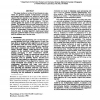Free Online Productivity Tools
i2Speak
i2Symbol
i2OCR
iTex2Img
iWeb2Print
iWeb2Shot
i2Type
iPdf2Split
iPdf2Merge
i2Bopomofo
i2Arabic
i2Style
i2Image
i2PDF
iLatex2Rtf
Sci2ools
108
click to vote
VLDB
1990
ACM
1990
ACM
Hash-Based Join Algorithms for Multiprocessor Computers
This paper studies a number of hash-based join algorithms for general purpose multiprocessor computers with shared memory where the amount of memory allocated to the join operation is proportional to the number of processors assigned to the operation and a global hash table is built in this shared memory. The concurrent update and access to this global hash table is studied. The elapsed time and total processing time for these algorithms are analyzed. The results indicate that, hybrid hash join that outperforms other hash-based algorithms in uniprocessor systems does not always performs the best. A simpler algorithm, hash-based nested loops join, performs better in terms of elapsed time when both the relations are of similar sizes.
Related Content
| Added | 11 Aug 2010 |
| Updated | 11 Aug 2010 |
| Type | Conference |
| Year | 1990 |
| Where | VLDB |
| Authors | Hongjun Lu, Kian-Lee Tan, Ming-Chien Shan |
Comments (0)

